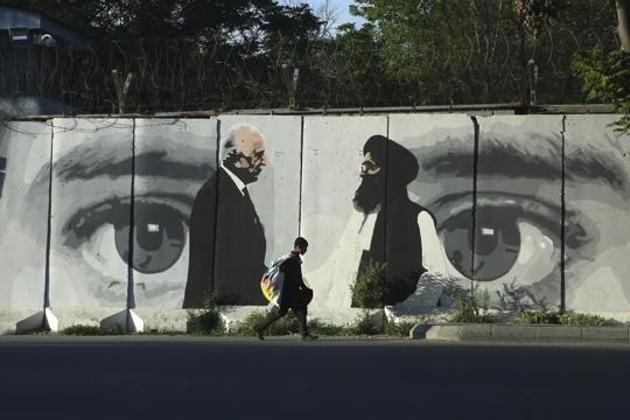In the Afghan theatre, India and its balancing act | Opinion
India must continue to support the people. But there is no reason for Delhi to openly talk with the Taliban
Prospects for peace in Afghanistan are uncertain. The February Doha Agreement was not about peace. For the Donald Trump Administration, it was meant to get the remaining United States (US) troops out of the country before the next presidential election. For the Taliban, it was to rid Afghanistan of foreign forces and bring it a step closer to take control over the Afghan government. The head of the Taliban, Mawlawi Hibatullah Akhundzada, described the Doha Agreement as the “Termination of Occupation Agreement”, while it is actually titled the “Agreement for Bringing Peace to Afghanistan.”

All Afghans yearn for peace. They are bound to, after four decades of incessant violence. That is why the restarting of hostilities by the Taliban has been so disheartening. On May 12, Afghan President Ashraf Ghani announced the resumption of offensive operations against the Taliban, in the wake of several terrorist attacks, including one targeting a maternity hospital in Kabul that killed dozens, including mothers and newborns.
The increase in Taliban violence has led to some discordance in Washington, DC. The Pentagon maintains that Taliban attacks have increased following the Doha Agreement. The State Department has been silent for the most part. Secretary of State, Mark Pompeo, noted that the Taliban denied any responsibility and condemned the recent attacks as heinous.
After a gap of two years, the Taliban has announced an Eid ceasefire, again without any guarantee of it being irreversible. This is an effort to establish Taliban bonafides and take forward the intra-Afghan process, supposed to have started on March 7.
The Doha Peace Deal, which blindsided the Afghan government, is not a capitulation to the Taliban. Rather, it is a capitulation to Pakistan. Pakistan’s objective is to have a pliant, Taliban-led government in Kabul, which would limit India’s presence in Afghanistan and provide a base for jihadi groups targeting India.
Afghanistan has two important neighbours. While Pakistan may be fully on board with the Doha Agreement, Iran is not. Notwithstanding their new-found equation with the Taliban, Iranians have denounced as “destructive” the US role in Afghanistan, and the sacrificing of the interests of the Afghan people.
Most international actors wish to engage with the Taliban. That the Taliban has friends is no reason for India to join the bandwagon. India was not consulted on the Doha Agreement. India has no responsibility for its implementation; it is for the protagonists to take it forward. India has been kept out by Pakistan on any material discussion about Afghanistan’s future, as the US accepted the Pakistan redline. That said, even if the US has decided to call it quits in Afghanistan, India cannot.
Recently, there was news that in Muhmand Dara, Nangarhar, most of those killed in a supposed Taliban camp are members of Jaish-e-Mohammed (JeM). Aslam Farooqi, head of the Islamic State of Khorasan Province, arrested in Afghanistan for his complicity in the Kabul gurudwara attack last month, was formerly with the Lashkar-e-Taiba (LeT). Both JeM and LeT have close ties with the Haqqani Network, whose leader, Sirajuddin Haqqani, is the deputy leader of the Taliban.
The Taliban’s ties with the Inter-Services Intelligence (ISI) are well-documented. Steve Coll writes in Directorate S: The C.I.A. and America’s Secret Wars in Afghanistan and Pakistan that the Haqqani Network has been the lynchpin of ISI’s covert policy since the 1970s. The group, the Taliban’s most important armed component, has targeted American forces in Afghanistan. It has also been the executioner targeting Indians in Afghanistan, including diplomats, military officers, and cooperation workers.
The argument that India must discuss its concerns with the Taliban is specious, as if the Taliban is unaware of these. True, the Taliban has not made statements against India, but the hand of the Haqqani Network is well-established in almost all the attacks on the Indian mission and posts in Afghanistan and the recent attack on the Kart-e-Parwan gurudwara in Kabul.
India has been supportive of efforts to bring genuine peace to Afghanistan. It has advised leaders of different ethnicities to work in cohesion with others for the common purposes of peace and nation-building. India favours the reintegration of insurgents and groups that give up their links with terrorist groups and networks, resile from violence, are inclusive, and embrace the Afghan Constitution. India opposes only the political accommodation of individuals, groups or organisations associated with known terrorist entities, since this will subvert the nascent Afghan democracy, undermine human rights, particularly women’s rights, and destroy emerging Afghan institutions. A further concern is that restoration of status-quo-ante in Afghanistan could lead to the unravelling of the state system in neighbouring Pakistan, with imponderable consequences.
India must, as it has been, remain supportive of the Afghan people and their government, which needs to continue standing on its feet and taking its own decisions. India has to be far more proactive in doing so and openly engage with all actors across the political spectrum, including the moderate Taliban leaders through covert contacts. India has a decent track record in dealing with Islam-oriented regimes. Were the Taliban to change its behaviour, which given its present composition seems unlikely, India would have no problem interacting with it.






